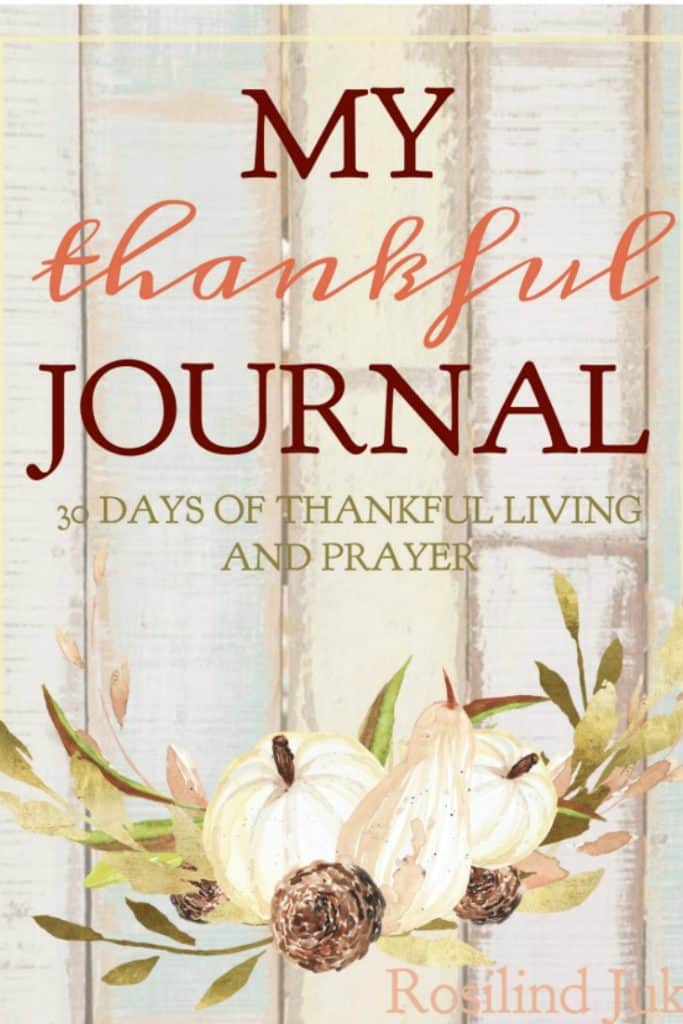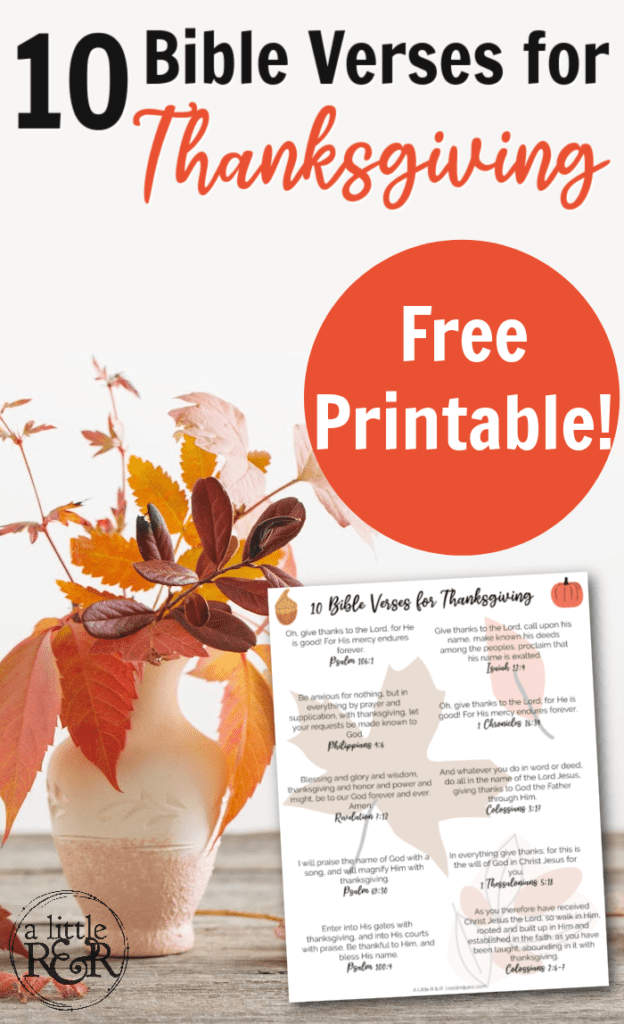4 Ways to Cultivate a Thankful Heart When You Don’t Feel Thankful
I hope you love the products and resources I recommend here at A Little R & R. Just so you know, it is possible that I get a commission and collect income from the links on this page. Click here for more info.

Have you ever noticed that we don’t naturally live thankfully?
Sure, there are the “glass-half-full” people who tend to be more sanguine, and therefore think more positively. But that’s not what I’m talking about.
I’m talking about the fact that we don’t naturally live in a way where we are continually aware of the little things in life for which we should be grateful.
What I’ve found is that those who do live like that most often point back to a specific event in their life that caused them to become keenly aware of their own mortality and the profound need to use what time they have left in life to be an example to others.
Thankfulness is something that must be developed and cultivated.
Like godly character, thankfulness isn’t a gift or personality trait that we’re born with. It is a spiritual discipline that must be developed, exercised, and grown in our lives.
I believe this is why Scripture instructs us over and over to be thankful, to give thanks always and continually.
Have you ever wondered what it would be like to live with someone who gave thanks continually?
I find it odd that as a society we denigrate people who live this way. We call them “Pollyanna”, say they wear rose-colored glasses, and insinuate that they don’t live in reality.
As if reality demands that we are cynical, negative, and critical.
When bad things happen to good people, good people have two choices:
- Allow the negative circumstance to make them bitter, cynical, and angry
- Allow God to do a work of grace in their hearts so that He can bring good out of the negative circumstance and thus glorify Himself through it.
Imagine what life would be like if we continually responded by allowing God to do a work of grace in our hearts.
This response isn’t natural, but it can be cultivated through discipline and renewing our minds.
There are four ways we can cultivate a thankful heart, so that we live life giving thanks continually.
1. Memorizing and meditating on Scripture
“Oh come, let us sing to the Lord; let us make a joyful noise to the rock of our salvation! Let us come into his presence with thanksgiving; let us make a joyful noise to him with songs of praise!” Psalm 95:1-2
If we want to renew our minds, we must make it a daily discipline to memorize and meditate on Scripture. Scripture memorization and biblical meditation retrain the mind so that it comes into agreement with God’s thoughts.
It replaces the negative thought patterns with God Word, so that in difficult circumstances our thoughts cease to default to negativity, self-doubt, criticism, and cynicism but rather to biblical declarations and principles.
Here are some articles I’ve written on memorizing and meditating on Scripture:
4 Tips For Memorizing Scripture
3 Easy Ways to Memorize Scripture
How to Memorize Scripture Using Word Associations
3 Steps to Christian Meditation for Beginners
How Eastern Meditation Differs from Biblical Meditation
2. Pray the Scripture
This is different from memorizing and meditation. Certainly, it will help you do both, but it is a different practice entirely.
By praying Scripture, you are taking your present circumstance and coming into agreement with God about it.
Let’s say you begin experiencing discrimination on the job because you are a Christian. Your boss cuts your hours, purposely schedules you on Sundays so you can’t go to church, or makes degrading remarks around you to others, you can pray Scripture to bring your heart back into right alignment and guard against bitterness and anger.
“God, Your Word says that no weapon formed against me shall prosper and every tongue which rises against me in judgment I shall condemn. You said that this is my heritage from You and that my righteousness comes from You. Now I pray that the weapon the enemy has formed against me at my job will not prosper! Not only that, may that weapon be for his destruction! I pray that you will condemn and silence the tongue of the enemy against me and win the victory for me at my job. I pray that this will be a testimony of Your greatness and power and will bring You glory. Amen.”
Learn to take Scripture, personalize it, and apply it to your present circumstance so that you can see your life through God’s perspective and through the lens of Scripture.
3. Keep a journal
For the Lord is a great God, and a great King above all gods. In his hand are the depths of the earth; the heights of the mountains are his also. The sea is his, for he made it, and his hands formed the dry land. Psalm 95:3-5
I love how the writer of this Psalm pointed back to the miracle of God’s creation. Truly, the Bible is a journal of the works of God; and there is enormous power in recounting to God His great works of the past; because it reminds our hearts that if God came through then, He’ll come through again and again!
Journaling is a habit that every Christian should learn to develop, and I believe this for a couple of reasons.
First, the act of writing is extremely powerful. By slowing down to write our thoughts out by hand, our thinking processes deepen and we are more aware of our emotions.
I strongly believe that by slowing down and becoming more mindful of what is in our heart, we would see God’s hand at work in areas of our lives where we have previously been unaware.
Here’s a journal I use all year long!
Second, by keeping a written record of those things for which we are thankful, we are able to go back and remind ourselves of the goodness of the Lord. We see this example all throughout Scripture.
Throughout the Old and New Testaments, we read repeated accounts of how God freed His people, won battles for them on their behalf, and how He delivered them from their enemies. One could argue that at times the Bible is repetitive, yet at closer examination, we see that by repeating the works of God over and over, God’s people were encouraging their hearts in the Lord.
They were reminding their hearts that what God did in the past, He will do again!
This is an important practice for us today.
Victories that God won 20 years ago are perhaps forgotten today, but having a written reminder will keep them in the forefront of our minds as we rehearse the goodness and greatness of God!
4. Worship
Oh come, let us worship and bow down; let us kneel before the Lord our Maker. Psalm 95:6
Worship is a powerful tool in the arsenal of the believer!
True, authentic worship shifts our focus off of ourselves and our circumstances onto God, His greatness, and His sovereignty.
The very definition of worship is to attribute worth.
God’s worth is not determined by what value He has to us.
- What He has done for us
- What He means to us
- How we feel about Him
His worth actually has nothing at all to do with us at all! His worth is determined by who He is.
By taking ourselves entirely out of the picture and making who He is our focus: His name, His character, His power, and His sovereignty the focus of our worship, we gain an eternal perspective.
Suddenly, our circumstances are no longer so overwhelming in comparison to eternity!
Therefore we do not lose heart. Even though our outward man is perishing, yet the inward man is being renewed day by day. For our light affliction, which is but for a moment, is working for us a far more exceeding and eternal weight of glory, while we do not look at the things which are seen, but at the things which are not seen. For the things which are seen are temporary, but the things which are not seen are eternal. 2 Corinthians 4:16-18








Hi Rosalind,
I like to do a meditation on being grateful or loving kindness. Thanks for sharing 🙂
Yes – those are good things to meditate on.